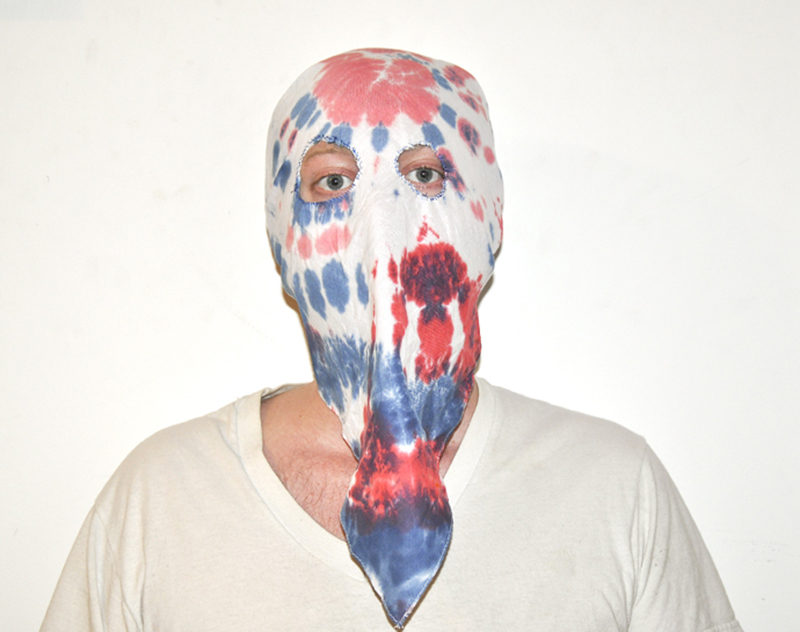I was supposed to meet Jesse Butcher on Saturday afternoon for a tour of his new gallery exhibit, “Until It Becomes Us,” but he was running late. When he arrived, he told me that his bus had been stopped in a riot: protesters had managed to block traffic entirely on Homan Avenue until police broke them apart. Butcher was split between admiration for the rioters’ passionate collective action and irritation at the thirty-minute traffic jam he had endured, an ambivalence that echoed strongly in his exhibition, presented by Ordinary Projects at Mana Contemporary through March 20. The words “PIG CITY” are spray-painted, silver and metallic, in an amateurish scrawl across a large, white canvas in the back of the gallery. The phrase can easily be read in conjunction with Chicago’s recent Homan Square controversy, but while Butcher sees the recent public response to police brutality in dialogue with his work, he says that he started using the term years ago, without reference to a single incident or even a particular city.
More tellingly, the canvas does not read “All pigs must die.” It names a condition rather than provoking action, and this passivity undercuts and complicates the piece’s incendiary slang.
“I know some people who would say, ‘I’m glad I live in a pig city,’” says Butcher.
His affinity for graffiti is not due to the medium’s ability to send a message, nor the allure of having one’s work visible citywide, but in the naïve, reckless gesture toward ownership inherent in petty vandalism.
“When you’re a kid, you go and write on a wall and it’s like ‘I did this, this is mine,’” he says. Even though a site’s real owners might paint over the tagger’s work, traces of the rebellious, facile claim to possession remains.
The interest that Butcher takes in these small, personal, short-lived victories is striking. The irony of a former-delinquent-turned-artist hanging his former-graffiti-turned-art in Mana Contemporary’s formerly-abandoned-warehouse-turned-gallery was not lost.
When asked if his work is political, Butcher shrugged. The work is certainly not nonpolitical, but it doesn’t have a singular, directional charge to which one could ascribe a set of politics. It gestures toward the forms and strategies of past avant-gardes—punk rock, second-wave feminism, Chris Burden’s “I Became a Secret Hippie”—and reproduces them skeptically, agnostic about their capability to actually affect change and humorously aware of their own situation. Still, the work expresses a small satisfaction in the very fact of its own circumscribed, temporary nature.
“Until It Becomes Us” is aware of the problematic nature of its own existence—including the Pilsen gentrification necessary for the gallery’s establishment—but Butcher doesn’t let unresolved problems prevent him from producing the art he is able to produce. Rather, the exhibition shows Butcher utilizing his temporary sovereignty over Ordinary Projects for the small joy of production and exhibition. He does not oblige himself to resolve the contradictions in that action.
A video Butcher took of himself several years ago begins with the artist writing “PUNK IS DAD” on a drywall structure. Then he tears the wall down. The message is quite literal for my generation: my dad was a punk, now he’s a lawyer. Your dad could have been a punk, now he could be a lawyer too. They probably tore down walls together and yelled things like “Anarchy in the U.K.!” and “Our band could be your life!” It’s been over thirty years and not only do most governments still exist, but England is still staunchly capitalist.
But tearing down walls is still pretty punk. Even if my dad was a total sellout and I’ll probably be a total sellout too, I can still think that tearing down walls or wearing masks or writing my name on stuff is cool for the gesture alone—even if the gesture is hypocritical or fails to convey meaning. Punk can be dead or dad or whatever, but “Until It Becomes Us” is still cool, because rebellious action doesn’t necessitate a coherent message to justify itself: sometimes you just want to make your mark somewhere.
Ordinary Projects, Mana Contemporary, 2233 S. Throop St. Gallery hours by appointment. Through March 20. info@ordinaryprojects.org
Correction March 11, 2015: An earlier version of this article misstated the gallery hours of Ordinary Projects. They are by appointment only.



